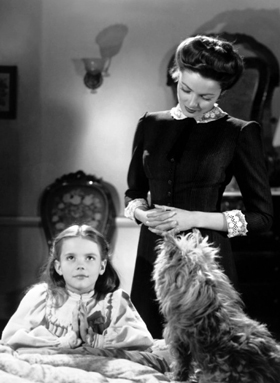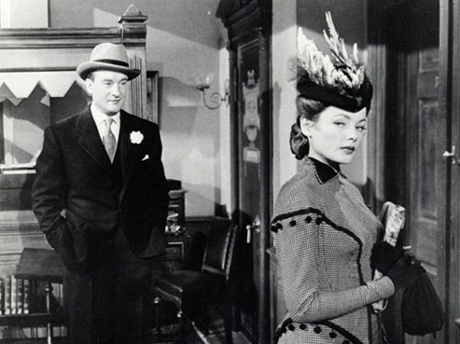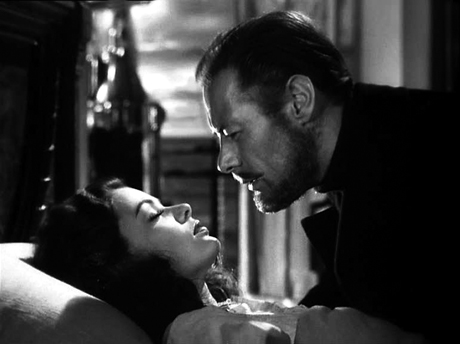Reviewed by Glenn Erickson
Sometimes we buy new Blu-rays of discs we already own on DVD, only to find that the difference in quality isn't all that apparent. This is definitely not the case with Fox's stunning new Blu of Joseph L. Mankiewicz romantic favorite The Ghost and Mrs. Muir. The popularity of this picture has increased over the years, in no small part due to the inclusion of one of composer Bernard Herrmann's best music scores. Philip Dunne provides the sensitive dialogue and Herrmann underlines the film's contrasting moods of loneliness, gaiety and spiritual mystery.
Ghosts weren't exactly a going thing in Hollywood of 1947. By then the second wave of gothic horror fare had departed except for comedies and parodies like Abbott and Costello Meet Frankenstein. Intelligent & serious ghost stories (The Uninvited) tended to be isolated one-shots and even fantastic movies about romantic phantoms (Portrait of Jennie) were rejected for being out of touch with the times. Ghosts were something for Danny Kaye or Bob Hope to make fun of.
Over at Fox were a couple of units that for several years had been quietly turning out modest Gothic stories: Dragonwyck, and a creditable version of Jane Eyre. Their B&W stylishness almost made them look English-made. For The Ghost and Mrs. Muir house talent Joe Mankeiwicz and Philip Dunne adapted a slim book by R.A. Dick, creating a brooding and wistful romance from beyond the grave. It's a delicate "woman's film" with far too much class to be a soap. The rich Gothic sensibility never strays into serious horror territory, but there is definitely something mystical and macabre in its delicate contrast between romantic delirium and the tragedy of a life spent mostly alone.

Like 90% of good Gothic stories, much of the film takes place on a windy bluff above the ocean. Widowed Lucy Muir (Gene Tierney) rents a house by the beach with just her maid Martha (Edna Best of The Man Who Knew Too Much) and her young daughter, Anna (Natalie Wood). To Lucy's surprise the house is haunted by the ghost of sea captain Daniel Gregg (Rex Harrison), a phantom who makes himself known to her and inspires her to write his memoirs in the form of racy fiction. Enthusiastically received by the publishers, Lucy's work is a popular hit. She becomes attracted to handsome Miles Fairley (George Sanders), a writer of children's stories. In hopes of matrimony she forgets the ghost of Captain Gregg, and the phantom recedes. But Lucy has more to learn about her fiancée Fairley, and more to learn about loneliness.
In other hands, like perhaps Robert Aldrich, The Ghost and Mrs. Muir could have become a fevered tale of bleak regret. Treated naturalistically it would be the story of a madwoman who invents a romance to take the place of a dead husband and a worthless suitor, and who lives out an empty life of isolation with only a servant to keep her company... the Miss Havisham story. That's where the strange, Peter Ibbetson- like romance comes in. The tale is both a film blanc (a visitation from the afterlife) and an amour fou (an unorthodox Love that crosses conventional boundaries). Lucy Muir's long life is simultaneously empty and fulfilled.
The Ghost and Mrs. Muir has a number of interesting things to say about what appeals to feminine ideals of romance. Lucy's husband is dead but she has no particular desire to see him return to life. Instead Lucy dreams of a Gothic hero, a rough but gentlemanly rogue, a Flying Dutchman-like spirit of adventure and travel. The main evidence that Captain Daniel is real is Lucy's book, which the publishers and public adores because of its unvarnished authenticity. How could a lone spinster imagine all those events on the high seas? Well, she can invent the man, can't she? The psychological potential for Lucy to have researched her dream lover and his adventures gives the film a quiet ambiguity. The real subject at hand is not ghosts, but romance.
The combination of elements in Philip Dunne's script was perfect for the tastes of the conservative female public circa 1947. The idea of being beautiful Gene Tierney, widowed but free to live on the edge of a beautiful ocean (all filmed on the Palos Verdes coastline) was probably irresistible -- especially with a devoted maid around to do all the work. No men tell one what to do or when supper needs to be served. Lucy Muir takes long walks on the beach, and needn't give a hoot about what her relatives or the real estate people think. Perhaps that's as about as emancipated a woman could find in 1900, or 1947, for that matter. As the maid gleefully remarks when Lucy breaks away from her grasping in-laws, "It's a revolution!"
Lucy also finds her own way financially thanks to the nicely managed but rather convenient subplot of instantaneous literary success. There the story owes a bit to Little Women, except that Lucy becomes a famous author by indulging wild fantasies, not writing about a life she knows.
Most escapism of the time would instantly prescribe a man for what ails Lucy, or better, lots of men. That's where The Ghost and Mrs. Muir deviates from the norm. Captain Gregg is good company at the odd times he chooses to appear, but he's not flesh & blood. They both know that that is what Lucy (or Lucia, as Gregg calls her) needs. There is a sadness about Lucy's life. In less glamorous surroundings, this could be a tale of isolation and estrangement.

It almost is. Lucy's romance with the ghost clearly has no sex angle, just the thrill of being worshipped by a handsome lover. So the audience gets the soulful romance without the sex. It's just the kind of masochistic thrill that became popular in soapy 50s pictures. 1 But there are some interesting twists. In a terrific scene with the wonderful Anna Lee, Lucy finds that she has become the "other woman" in a faithless triangle. The sobering novelty of the moment places no satisfaction in adultery, the foundation of many a Hollywood potboiler. Muir's yearning for her married beau dissolves as soon as the truth comes out. Refreshingly, the story places the blame on the wayward and deceitful man, and notes a sad but unspoken bond between the wronged women.
All of Lucy's real relationships are with other women, with her maid as the only lasting one. Her daughter Anna (initially a cute Natalie Wood) has her own life to lead and as such becomes as remote as the outside world that Lucy has rejected. Both the maid and Anna have vague memories of hearing and seeing Captain Gregg too, a nice touch.
The Ghost and Mrs. Muir is in some ways a female Vincent Price movie, an "Ellen Allan Poe" picture. Like a Poe character, Muir lives in isolation, indulges in delirious fantasies, has disastrous relationships with outsiders and obsesses over lost loves real and imagined. It's all from a distinctively female perspective, however. Time has a different meaning. Muir is less rushed and less desperate in her actions than a Poe protagonist. When the years make her gray and rot the wood down on the beach, a crushing dread intrudes, a feeling of loss and perhaps waste. But it's a natural feeling derived from life and not some supernatural curse of guilt or honor. The mature philosophy presented is contrary to Poe's fated morbidity. People get old and lonely and they die, and life moves on. It's supposed to be that way.
Consistent and classy, The Ghost and Mrs. Muir ends on an exultant film blanc note that reverses the grim mood of the final reels. Love conquers time and tide to reunite lovers that never actually met. Love works just as memory works -- love someone for a long time and your interaction with that person can have the time-defeating effect of rejuvenation ... it's a fact. The film's transcendent conclusion is the rare instance of a "sappy romantic ending" that's thematically sound and in tune with reality. 2

Gene Tierney is radiant as Lucy and Harrison uses his voice to great effect as the ghost. Both are aided by the period setting and Philip Dunne's amusing dialogue. George Sanders is perfectly cast as a transparent cad, and Edna Best's housemaid-companion avoids the obvious pitfalls.
The overriding, unifying and tone-enforcing element that binds The Ghost and Mrs. Muir together is once again Bernard Herrmann's music. This is one of his two or three best scores -- romantic and plaintive, it combines feelings of loneliness, loss and hope. It comes down hard and heavy on the theme of a ruthless Time that wipes out youth and dreams like driftwood on a beach. Herrmann was often called on to prop up pictures that needed great music just to function, but here the match is perfect.
20th Century Fox Studio Classics' Blu-ray of The Ghost and Mrs. Muir is a big improvement over their old Studio Classics DVD issued exactly ten years ago. The image is richer, cleaner, and more stable -- the hightened contrast and enhanced sharpness bring out more shadow detail in Charles Lang's crisp cinematography. The HD mono track also allows more dynamism in the Bernard Herrmann score. Sadly, no isolated track is available for this show -- the music is like a 90-minute concert.
The extras from the old DVD are all here save one. Two full commentaries are back; one with Greg Kimble and Christopher Husted, and a second with Jeanine Basinger and Kenneth Geist. A trailer is included. At this point the one reason to keep the 2003 disc is that it contains a full hour-long Biography show on Rex Harrison, which has been dropped from the new disc. As before, the picture includes French and Spanish dubs, and subtitles in all three languages plus Italian and Dutch.
Fox's cover art and disc art use a generic image of a white steamship more suitable for a release of The Sand Pebbles.
On a scale of Excellent, Good, Fair, and Poor,
The Ghost and Mrs. Muir Blu-ray rates:
Movie: Excellent
Video: Excellent
Sound: Excellent
Supplements: Commentaries with Greg Kimble, Christopher Husted; Jeanine Bassinger and
Kenneth Geist; trailer
Deaf and Hearing-impaired Friendly?
YES; Subtitles: English, French, Spanish, Italian, Dutch
Packaging: Keep case
Reviewed: December 14, 2013
Footnotes:
1. The 'fifties were good years for censor-safe stifled romances, both interracial (Love is a Many Splendored Thing) and impossible (Heaven Knows, Mister Allison) that were all sizzle and little steak. Those romance-magazine readers couldn't get enough of absurd situations where affairs could be cut short by dramatic events, sparing the lovers the dull problems of normal life.
Return
2. A Roman Polanski short subject called When Angels Fall is included on Criterion's disc of Knife in the Water. A dowdy old scrubwoman washes floors until she dies, alone and unloved. She's been dreaming all the while about the handsome soldier she knew as a young girl. As she breathes her last breath the film goes totally fantastic and the handsome phantom appears levitating through a skylight to carry her off at last (shades of Dance of the Vampires). Although based on a short story, the color short plays like a thematic homage to The Ghost and Mrs. Muir.
Return

DVD Savant Text © Copyright 2013 Glenn Erickson
See more exclusive reviews on the Savant Main Page.
Reviews on the Savant main site have additional credits information and are often updated and annotated with reader input and graphics.
Also, don't forget the
2011 Savant Wish List.
T'was Ever Thus.
Return to Top of Page
|


